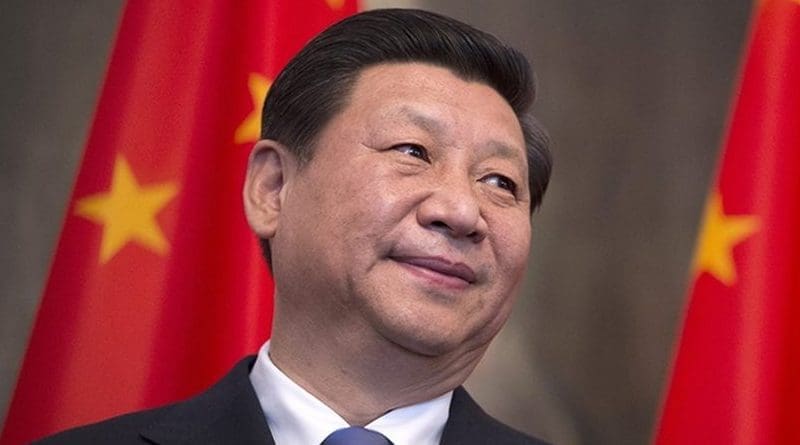Sino-South Korean Relations: Towards Improvement? – Analysis
By Observer Research Foundation
No matter how Beijing-Seoul relations develop, South Korea’s economic dependence on China will not change in the near future since China is its largest trading partner.
By Simran Walia*
China’s relations with South Korea hold significant relevance in the international arena. The two countries formally established their diplomatic relations in 1992 and became important economic partners. Despite Beijing’s historical alliance with North Korea and Seoul’s close ties with Washington, China is the biggest trading partner of South Korea. While business ties dramatically expanded, Seoul moved from relying completely on the United States to balancing between Washington and Beijing.
One of the major driving forces behind the expansion of Sino-South Korean economic links was the complementarity borne out of geo-political proximity. Korean companies have supplied parts, materials and equipment for China’s electronic, general machinery and other industries, supporting their phenomenal growth. Moreover, bilateral trade in auto parts, insignificant in the early 90s, has grown at a remarkable pace.
After North Korea’s fourth nuclear test, in January 2016, South Korean President Park Geun-hye’s administration initiated talks with the U.S. on the installation of an Anti-Ballistic-Missile System in Korea. An agreement, in July 2016 assumed that THAAD or the Terminal High Altitude Area Defense system, would reach full operational capacity by the end of 2017. It is an American Anti-Ballistic Missile System designed to shoot down short, medium and intermediate range ballistic missiles in their terminal phase if Seoul continues to face threats from Pyongyang. China condemned the THAAD deployment, arguing that the radar associated with the system could monitor Chinese airspace.
The diplomatic dispute between Seoul and Beijing led China to crack down on South Korean businesses as retaliation. At the end of 2016, China began to exert economic pressure on South Korea through unofficial sanctions, especially on the tourism and entertainment industries. Chinese tour groups were banned from visiting South Korea and Korean entertainers were forbidden from performing in China. Tensions escalated between Beijing and Seoul during the political crisis in South Korea that involved the impeachment of President Park and early elections. China hoped that the economic pressure would coerce President Moon Jae-in to withdraw from the THAAD agreement. Moon initially opposed the system, arguing that his predecessor’s decision on the matter was illegal. Eventually, though, after yet another round of North Korean missile tests, Moon agreed to finalize the deployment and added the other four launchers in September 2017. Seoul agreed to the deployment in order to protect itself in lieu of the ‘self-defense’ act and it was a way for the US to show its solidarity with South Korea. The other reason for strained ties between the two nations is the North Korean nuclear issue since Seoul countered because of Pyongyang’s development of nuclear weapons. Complete denuclearisation of the Korean Peninsula is vital to ease tension between China and South Korea. In the Hanoi Summit, of February 2019 between President Trump and President Kim, no concrete solution had come up for denuclearisation.
South Korea made it clear that the deployment was not aimed at any other country and it certainly did not harm China’s security and strategic interests. However, China’s position on THAAD has remained consistent. The dispute between the two countries over this issue has also destabilized the security situation in East Asian region. Chinese Foreign Ministry spokesman Geng Shuang warned in 2017, that further THAAD deployment “can only severely damage the strategic security balance in the region,” harm the strategic interests of other countries such as China and cause further antagonism on the Korean Peninsula. Their relations showed certain signs of improvement in late 2017.
The subsequent nuclear threats by North Korea and the intensity of US-North Korea tensions caused China and South Korea to work towards improving their relations. Therefore, eventually, South Korea determinedly declared that it would not consider additional THAAD deployments and would not participate in the US Global Missile-Defense Network. This year’s trade war between the US and China took a toll on South Korea’s export-driven economy. According to China, improving relations with South Korea is essential to stabilize its neighbourhood and to keep both South Korea and North Korea within its sphere of influence. The Chinese government also believes that its relations can be improved with South Korea if it softens its stance on THAAD. The thaw in diplomatic tensions came as a relief for Seoul, particularly for South Korean retail firms and tourism as well as pop-stars and filmmakers, who found themselves isolated from China.
No matter how Beijing-Seoul relations develop, South Korea’s economic dependence on China will not change in the near future since China is its largest trading partner. In the years from 2015-17, the US and China accounted for 38.1 % of Korea’s total exports. It is a fact that no country will ever be willing to rely so much on another for its trade and economic interests. Henceforth, President Moon’s New Southern Policy aims at deepening ties with Southeast Asia, to widen its diplomatic engagement and curb its dependence on neighbouring countries in trade. Moon visited Indonesia, the Philippines, Vietnam, Singapore and India in March 2019 to promote its New Southern Policy and protect its interests.
China and South Korea both believe that the cooperation between the two serves their common interests. The improvement of their relations will also condition their cooperation with the US on North Korea. Moreover, from a security perspective, China-South Korea dialogue is essential to ease the tensions on the Korean Peninsula. In addition, through the New Southern Policy, Seoul will seek to reduce its continued dependence on Beijing by diversifying its markets in Southeast Asia and India. This way Seoul will not feel burdened to rely only on China and the US for trade. How China-South Korea economic and trade relations develop in the near future remains uncertain.

